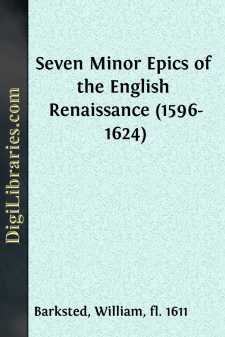Categories
- Antiques & Collectibles 13
- Architecture 36
- Art 48
- Bibles 22
- Biography & Autobiography 813
- Body, Mind & Spirit 142
- Business & Economics 28
- Children's Books 16
- Children's Fiction 13
- Computers 4
- Cooking 94
- Crafts & Hobbies 4
- Drama 346
- Education 46
- Family & Relationships 57
- Fiction 11829
- Games 19
- Gardening 17
- Health & Fitness 34
- History 1377
- House & Home 1
- Humor 147
- Juvenile Fiction 1873
- Juvenile Nonfiction 202
- Language Arts & Disciplines 88
- Law 16
- Literary Collections 686
- Literary Criticism 179
- Mathematics 13
- Medical 41
- Music 40
- Nature 179
- Non-Classifiable 1768
- Performing Arts 7
- Periodicals 1453
- Philosophy 64
- Photography 2
- Poetry 896
- Political Science 203
- Psychology 42
- Reference 154
- Religion 513
- Science 126
- Self-Help 84
- Social Science 81
- Sports & Recreation 34
- Study Aids 3
- Technology & Engineering 59
- Transportation 23
- Travel 463
- True Crime 29
Seven Minor Epics of the English Renaissance (1596-1624)
by: William Barksted
Categories:
Description:
Excerpt
INTRODUCTION
Professor Elizabeth Story Donno, in her recent (New York, 1963), has made an important contribution to both scholarship and teaching. Not only has she brought together for the first time in one volume most of the extant Elizabethan minor epics, but in so doing, she has hastened the recognition that the minor epic, or "epyllion" as it has often been called in modern times,[] is a distinctive literary genre as deserving of study as the sonnet, the pastoral, or the verse satire.
The purpose of the present volume is to supplement and complement Professor Donno's collection by making available in facsimile seven minor epics of the English Renaissance omitted from it. With the publication of these poems all the known, surviving minor epics of the Elizabethan and Jacobean periods will for the first time be made available for study in faithful reproductions of the earliest extant editions.
Of the seven minor epics included here, three— 19886 (1624); Dunstan Gale's 11527 (1617); and S[amuel] P[age's] (1613)[]—have not previously been reprinted in modern times. And of these three, one, though listed in the seems not to have been noticed by Renaissance scholars, nor even by any of the principal bibliographers except William C. Hazlitt, who gives this unique copy bare mention as a book from Robert Burton's collection.[]
The remaining four books—R[ichard] L[ynche's][] published with Lynche's 17091 (1596); William Barksted's 1429 (1607), published with by Lewes Machin; Barksted's 1428 (1611); and H. A's 968 (1613)—have been edited by the "indefatigable" Alexander B. Grosart in (Manchester, 1876-77), limited to 50 copies each and hence extremely scarce today.[] was also reprinted by Edward Arber in VII (Birmingham, 1883), 209-240. With the exception of these poems are printed in their approximate order of composition from 1596 to 1613.[]
AUTHORSHIP
As befits the paucity of their known literary productions, the authors of these poems have in common chiefly their anonymity, or a degree of obscurity approaching it. The authors of and of H. A's are unknown. Though the authors of the other poems are known, little is known about them. The mystery of the authorship of was compounded in the nineteenth century by its incorrect attribution to one Henry Austin. Grosart, for example, argued that the H. A. on the title page and on the address "To the Reader" of the 1614 impression, and the A. H. on the corresponding pages of the 1620 impression, 970, was the Austin denounced by Thomas Heywood for stealing his translations of Ovid's and Arthur Melville Clark, in correcting this error, pointed out that these stolen translations of Ovid should not be confused with an original poetic composition based on Book X of a quite different work by Ovid, ...


